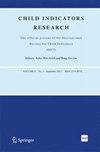Parent-child Discrepancies in Reporting Children’s Mental Health: Do Physical Custody Arrangements in Post-separation Families Matter?
IF 2.1
3区 社会学
Q1 SOCIAL SCIENCES, INTERDISCIPLINARY
引用次数: 0
Abstract
Abstract Most analyses of children’s well-being in separated families are based on reports provided by parents. Thus, the question arises whether discrepancies between parents’ proxy reports and children’s self-reports exist and whether they impact explanatory models of children’s well-being. Since a family’s physical custody arrangement could systematically affect parents’ ratings of their children’s mental health, and this association has not been examined before, this study investigates parent-child discrepancies in reporting children’s mental health problems in separated families with different physical custody arrangements. Drawing on data from the German Family Panel (pairfam), multinomial logistic regression and multilevel mixed-effects models were estimated for 786 parent-child dyads nested in 622 families with children between the ages of 9 and 17. To measure children’s mental health, we used two subscales (emotional and conduct problems) of the Strengths and Difficulties Questionnaire (SDQ). The findings suggested that the relationship between physical custody arrangements and children’s mental health differs depending on whether the children’s or the parents’ data are used. Physical custody arrangements and informant discrepancies were not associated. Parents’ mental health and the quality of parent-child relationships appear more relevant in understanding informant discrepancies than physical custody arrangements.亲子报告儿童心理健康的差异:分居后家庭的身体监护安排重要吗?
摘要对离散家庭儿童幸福感的分析大多基于父母提供的报告。因此,问题出现了父母的代理报告和儿童的自我报告之间是否存在差异,以及它们是否影响儿童福祉的解释模型。由于家庭的实际监护安排会系统地影响父母对子女心理健康的评价,而这种联系以前从未被研究过,本研究调查了不同实际监护安排的离散家庭中儿童心理健康问题报告的亲子差异。利用德国家庭小组(parairfam)的数据,多项逻辑回归和多层次混合效应模型估计了622个家庭中786对父母-子女二人组的年龄在9至17岁之间。为了测量儿童的心理健康,我们使用了优势与困难问卷(SDQ)的两个分量表(情绪和行为问题)。研究结果表明,实际监护安排与儿童心理健康之间的关系取决于使用的是儿童的数据还是父母的数据。实际保管安排和资料不一致没有联系。与实际监护安排相比,父母的心理健康和亲子关系质量在理解被告知者的差异方面显得更为相关。
本文章由计算机程序翻译,如有差异,请以英文原文为准。
求助全文
约1分钟内获得全文
求助全文
来源期刊

Child Indicators Research
SOCIAL SCIENCES, INTERDISCIPLINARY-
CiteScore
4.90
自引率
14.30%
发文量
103
期刊介绍:
Child Indicators Research is an international, peer-reviewed quarterly that focuses on measurements and indicators of children''s well-being, and their usage within multiple domains and in diverse cultures. The Journal will present measures and data resources, analysis of the data, exploration of theoretical issues, and information about the status of children, as well as the implementation of this information in policy and practice. It explores how child indicators can be used to improve the development and well-being of children. Child Indicators Research will provide a unique, applied perspective, by presenting a variety of analytical models, different perspectives, and a range of social policy regimes. The Journal will break through the current ‘isolation’ of academicians, researchers and practitioners and serve as a ‘natural habitat’ for anyone interested in child indicators. Unique and exclusive, the Journal will be a source of high quality, policy impact and rigorous scientific papers. Readership: academicians, researchers, government officials, data collectors, providers of funding, practitioners, and journalists who have an interest in children’s well-being issues.
 求助内容:
求助内容: 应助结果提醒方式:
应助结果提醒方式:


